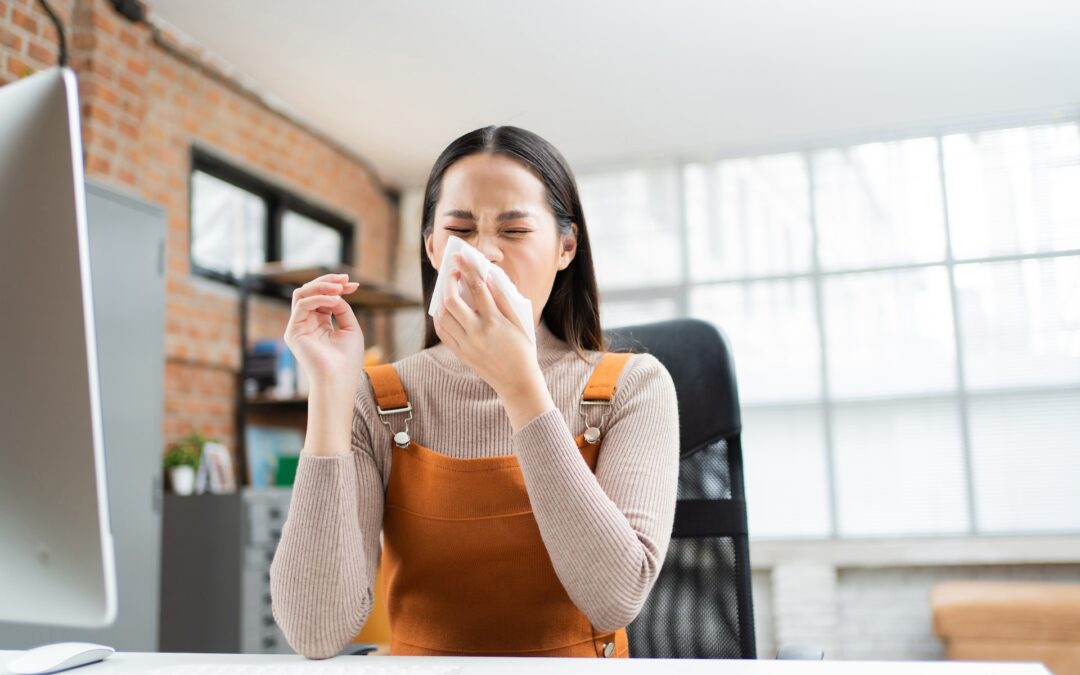Allergies are a common condition that affects millions of people worldwide. They occur when the immune system overreacts to a substance that is typically harmless, such as pollen, pet dander, or certain foods. Allergies can cause a range of symptoms, from mild to severe, and can significantly impact a person’s quality of life.
Allergies typically develop during childhood. Children are exposed to various potential allergens, such as pollen, dust mites, and certain foods, which can trigger an immune response. Over time, repeated exposure to these allergens can cause the immune system to become sensitized, producing immunoglobulin E (IgE) antibodies in response to the allergen. Once the immune system is sensitized, subsequent exposure to the allergen can cause a range of symptoms, such as hives, itching, sneezing, and difficulty breathing. These symptoms can be mild or severe, depending on the person’s sensitivity to the allergen. However, many people don’t know that adults can also develop allergies. Few people know how this happens, so we will discuss the details in this article.
How Allergies Develop
Allergies typically develop during childhood, although they can develop at any age. Children are more susceptible to allergies because their immune systems are still developing and exposed to various potential allergens. Allergies develop in two phases: sensitization and allergic reaction. During sensitization, the immune system responds to a particular substance, such as pollen or pet dander, by producing IgE antibodies. These antibodies are specific to the allergen and act as a defense mechanism against it.
During the second phase, an allergic reaction occurs. When the immune system is exposed to the allergen again, it releases inflammatory substances, including histamine, which causes blood vessels to dilate, mucus to form, skin to itch, and airway tissues to swell up. This can cause a range of symptoms, such as sneezing, coughing, itching, and difficulty breathing.
In adults, allergies may develop due to environment, lifestyle, or immune system changes. For example, an adult may develop a pollen allergy after moving to a new area with different types of plants. Similarly, an adult may develop a food allergy after eating food they have never had before.
For example, an adult may develop a pollen allergy after moving to a new area with different types of plants. Similarly, an adult may develop a food allergy after eating food they have never had before. In some cases, allergies may be triggered by stress, illness, or exposure to other environmental factors.
Common Adult Allergies
There are many different types of allergies that adults can develop, including:
Food Allergies
Food allergies are caused by certain particles that aggravate the condition. Common food allergens include peanuts, tree nuts, shellfish, and wheat. Symptoms of a food allergy can range from mild (such as hives or itching) to severe (such as anaphylaxis).
Seasonal Allergies
Also known as hay fever, seasonal allergies are more common in adults than children. Seasonal allergies are typically caused by pollen from trees, grasses, and weeds and can cause symptoms such as sneezing, runny nose, and itchy eyes.
Pet Allergies
Pet allergies are typically caused by proteins in a pet’s skin cells, urine, or saliva. Symptoms of a pet allergy can range from mild (such as sneezing or runny nose) to severe (such as difficulty breathing or anaphylaxis).
Can Allergies Go Away with Time?
In some cases, allergies may go away with time. This is because the immune function decreases as a person ages, and the immune response becomes less severe. However, this is not always the case, and some people may continue to experience allergies throughout their lifetime.
Simply put, your childhood allergies may or may not go away with time. It depends on the individual and their immune system, so it’s recommended to consult a healthcare professional to manage allergies and find the best treatment options.
Allergy Treatment
There are several treatment options available for people with allergies. These include:
Antihistamines
Antihistamines relieve the most common symptoms of allergies, such as itching, sneezing, and runny nose. They work by blocking the effects of histamine, which the immune system releases during an allergic reaction.
Immunotherapy
Also known as allergy shots, immunotherapy involves gradually exposing a person to small amounts of the allergen over time. This can help desensitize the immune system and reduce the severity of the allergic reaction.
EpiPen
The EpiPen is a device that contains a dose of epinephrine, which can be used to treat severe allergic reactions, such as anaphylaxis. Having one on you at all costs is recommended, especially if you’re traveling far.
Getting a Skin-Prick Test
A skin-prick test determines which allergens a person is sensitive to. During this test, a small amount of the allergen is placed on the skin, and the skin is pricked to allow the allergen to enter the body. A person allergic to the allergen will develop a small raised bump on the skin.
Conclusion
Allergies are a common condition affecting millions worldwide, whether children or adults. For this reason, one must understand the causes and symptoms of allergies to manage them effectively, especially if they have had it since childhood. This ensures that they can avoid triggers and take necessary precautions to prevent severe allergic reactions.
If you’re looking for an allergy relief skin patch, QEStrong has what you need! Our product is made with natural ingredients for increased effectiveness, and we also offer other selections for pain relief, weight loss, and other supplements. Call us today at 972-945-1126 to place an order!








